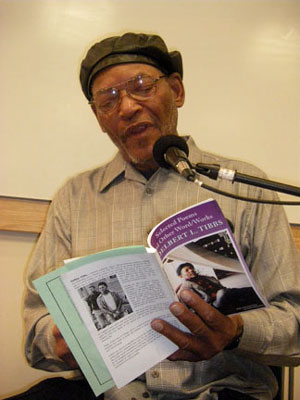
CHICAGO (FinalCall.com) – Delbert Lee Tibbs always has been against the death penalty, but ever since he was forced to serve three years on Florida’s death row for a crime he did not commit, eliminating the death penalty has become his life’s mission.
“If you’re Black and grew up in America, you know nothing else has been applied fairly, so why would the death penalty be applied fairly?” he asked several dozen people gathered for a special poetry reading session in his honor. “I believe God has chosen me for this job and I will work (to eliminate executions) until it’s gone away.”
Reading from two of his books of poetry, Mr. Tibbs said the government knows it has killed innocent people “who haven’t done a damned thing.” He applauded the moratorium against the death penalty in Illinois implemented by former Gov. George Ryan and condemned the recent Supreme Court ruling that upheld executions by lethal injection.
Statistics show that when given a choice, the American people prefer to give life in prison over death, Mr. Tibbs said. People who prefer the death penalty feel that by killing people they don’t have to be afraid anymore, but that also has been proven wrong, he said.
Race and discrimination have played major roles in the application of the death penalty, studies have revealed. Executions were more than 10 times likely to occur when the victim was White, according to the Death Penalty Information Center. More than 120 people have been released from death row with evidence of their innocence, the center reports, and 42 percent of inmates on death row are Black.
Mr. Tibbs was convicted in 1974 of murdering a 27-year-old White man and raping the man’s 17-year-old girlfriend, even though the girl’s description of the attacker did not match Mr. Tibbs, who also had an alibi.
The Florida Supreme Court overturned his conviction in 1977, but the state continued to threaten a retrial until 1982 when the original prosecutor said the case was so flawed that he would testify in Mr. Tibbs’ defense at a retrial.
Mr. Tibbs said bitterness and anger about his wrongful conviction sometimes arises, but he has learned to let it go. Dwelling on bitterness would destroy me, he said.
“What happened to me was mild compared to the brothers up in this wilderness,” he said of others who have served on death row much longer and who weren’t as fortunate as he was to have a national movement organized for his release.
Interviewed by local radio talk show host Cliff Kelley, Mr. Tibbs referred to Mumia Abu Jamal as one of his heroes. Many view Mr. Abu Jamal, a death row inmate who’s the center of an international movement, as a political prisoner. Organizers were hopeful that a call would come during the program from the Philadelphia death row inmate accused of a 1981 slaying of a Philadelphia police officer.
“Mumia is a great titan. He’s a giant,” Mr. Tibbs said. “In addition to fighting for his own release, he’s fighting the injustice of the whole system.”
An environmentalist, Mr. Tibbs’ poetry covers such issues as the insanity of human beings destroying animal life and the environment, and media fascination with the indecent exposure of Janet Jackson during the 2004 Super Bowl.
Concerned about the increasing levels of violence among youth, Mr. Tibbs said he is forming a mentoring program that will bring elders in contact with young people. He is also impressed by the candidacy of Sen. Barack Obama, who is seeking to be the Democratic Party’s nominee for president.
Sen. Obama has caught the fascination of the babies of those who wanted to but did not support Rev. Jesse Jackson’s run, Mr. Tibbs said.
“Also, Barack is hip,” he continued. “White folks have always loved hip Black folks, even though they might not have always wanted you to live next door.”












